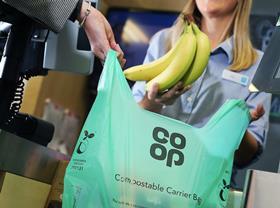
Co-op has begun phasing out single-use plastics on its own-brand products and switching to compostable carrier bags as part of a five-year strategy to limit its impact on the environment.
The pledge will see the retailer make all its own-brand packaging easy to recycle by 2023, with a minimum of 50 per cent recycled plastic in bottles, pots, trays and punnets by 2021.
In addition, all black and dark plastic packaging, including black ready meal trays, will be eliminated from Co-op’s own-brand products by 2020.
Almost three in four products that the Co-op makes are already widely recyclable, the retailer said, accounting for 95 per cent of its products when measured by weight.
But the cooperative said its new measures would be equivalent to taking a further 125 million plastic water bottles out of production.
The drive to reduce plastics will also see around 60 million plastic carrier bags gradually phased out and replaced with compostable carrier bags that shoppers can re-use as caddy liners for kitchen food waste.
The new bags, which will continue to be priced at 5p a bag, will be rolled out to almost 1,400 Co-op food stores across England, Scotland and Wales, initially in locations where the bags are accepted in food waste collections.
Co-op said the move would take 339 tonnes of plastic out of circulation, and the retailer hopes to extend coverage to more stores after talks with remaining local councils.
Commenting on the switch to compostable carrier bags, Co-op's retail chief executive Jo Whitfield said: “They are a simple but ingenious way to provide an environmentally-friendly alternative to plastic shopping bags.”
She added: “Our ban on single-use plastic is central to our new ethical blue-print.
The Co-op said its crackdown on single-use plastics was part of a new “hard-hitting ethical strategy”, to be launched at a supplier conference on 27 September, tackling plastic pollution as well as food waste, healthy eating, saving energy and Fairtrade.
The 'Future of Food' report has been developed to meet the UN’s sustainable development goals to end poverty, protect the planet and ensure prosperity for all by 2030.
The Co-op said it already sources 100 per cent renewable energy for its stores, but will go on to tackle greenhouse emissions through its logistics operations, as well as reducing energy, water and waste in its supply chain.






No comments yet